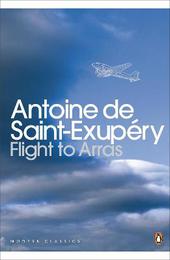
|
Flight to Arras
Paperback / softback
Main Details
| Title |
Flight to Arras
|
| Authors and Contributors |
By (author) Antoine Saint-Exupery
|
| Series | Penguin Modern Classics |
|---|
| Physical Properties |
| Format:Paperback / softback | | Pages:160 | | Dimensions(mm): Height 198,Width 129 |
|
| Category/Genre | Biographies and autobiography
Second world war |
|---|
| ISBN/Barcode |
9780141183183
|
| Classifications | Dewey:940.54214092 |
|---|
| Audience | |
|---|
|
Publishing Details |
| Publisher |
Penguin Books Ltd
|
| Imprint |
Penguin Classics
|
| Publication Date |
25 May 2000 |
| Publication Country |
United Kingdom
|
Description
On 22 May 1940, Antoine de Saint-Exupery set off on a reconnaissance operation from Orly over Nazi-occupied France to Arras. It was a pointless mission, since the French surrender was only weeks away, but still so dangerous that he was not expected to survive it. That journey and his return home are recorded in Flight to Arras, a profound and passionate meditation on mortality and war. "A thrilling literary work - as important now as it ever was" Guardian "A magic text, at times almost Biblical, of why men fight and how they feel in the presence of death" Time
Author Biography
Antoine de Saint-Exupery was born into an old French family in 1900. Despite his father's death in 1904 he had an idyllic childhood, shared with his brother and three sisters at the family's chateau near Lyon. He was educated at a strict Jesuit school in Le Mans and then at the college of Saint-Jean in Fribourg. Against the wishes of his family he qualified as a pilot during his national service, and flew in France and North Africa until his demobilization in 1923. Unsuited to civilian life and deeply hurt by a failed relationship with the writer Louise de Vilmorin, he returned to his first love, flying. In 1926 he joined the airline Latecoere, later to become Aeropostale, as one of its pioneering aviators, charged with opening mail routes to remote African colonies and to South America with primitive planes and in dangerous conditions. As airfield manager at the tiny outpost of Cape Juby in Morocco his duties included rescuing stranded pilots from rebel tribesmen, and it was there that he wrote Southern Mail, which was well received on its publication in 1929. From a later posting to Buenos Aires he brought the manuscript of Night Flight back to France, together with his fiancee, the beautiful but temperamental Consuelo Suncin. Night Flight was awarded the Prix Femina in 1931, firmly establishing his literary reputation. Flying an
|